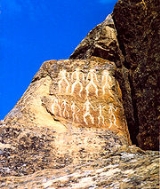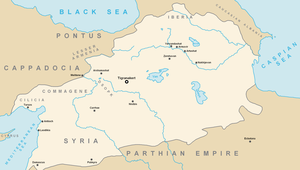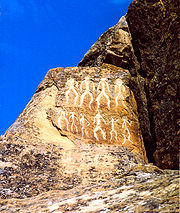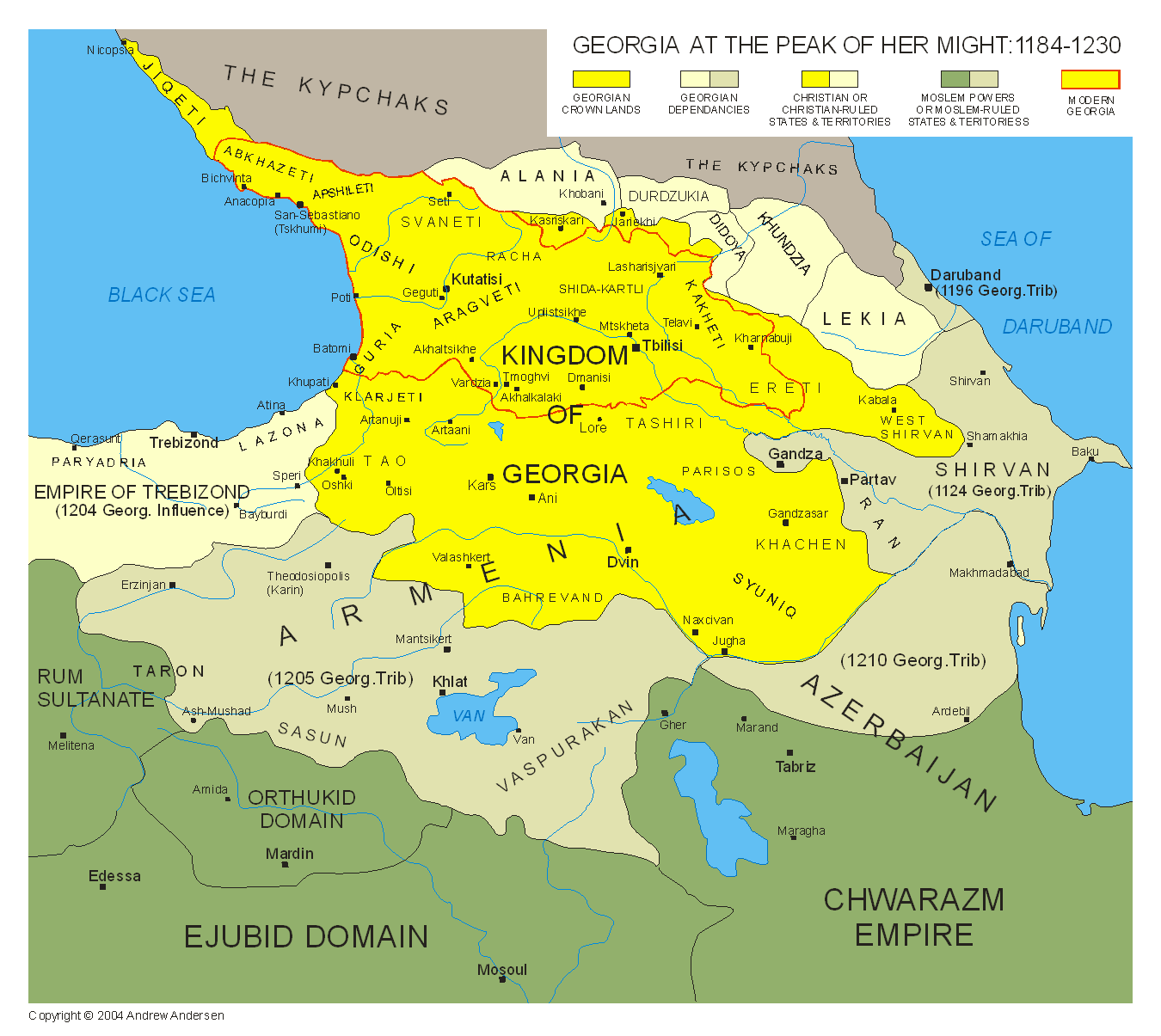
History of the Caucasus
Encyclopedia


Caucasus
The Caucasus, also Caucas or Caucasia , is a geopolitical region at the border of Europe and Asia, and situated between the Black and the Caspian sea...
region can be divided into the history of the Northern Caucasus (Ciscaucasia), historically in the sphere of influence of Scythia
Scythia
In antiquity, Scythian or Scyths were terms used by the Greeks to refer to certain Iranian groups of horse-riding nomadic pastoralists who dwelt on the Pontic-Caspian steppe...
and Southern Russia
North Caucasus
The North Caucasus is the northern part of the Caucasus region between the Black and Caspian Seas and within European Russia. The term is also used as a synonym for the North Caucasus economic region of Russia....
(Eastern Europe
Eastern Europe
Eastern Europe is the eastern part of Europe. The term has widely disparate geopolitical, geographical, cultural and socioeconomic readings, which makes it highly context-dependent and even volatile, and there are "almost as many definitions of Eastern Europe as there are scholars of the region"...
), and that of the Southern Caucasus (Transcaucasia; Caucasian Albania
Caucasian Albania
Albania is a name for the historical region of the eastern Caucasus, that existed on the territory of present-day republic of...
, Georgia
History of Georgia (country)
The nation of Georgia was first unified as a kingdom under the Bagrationi dynasty in the 9th to 10th century, arising from a number of predecessor states of ancient Colchis and Iberia...
, Armenia
Armenia
Armenia , officially the Republic of Armenia , is a landlocked mountainous country in the Caucasus region of Eurasia...
), in the sphere of influence of Anatolia
Anatolia
Anatolia is a geographic and historical term denoting the westernmost protrusion of Asia, comprising the majority of the Republic of Turkey...
, Assyira and Persia (Southwest Asia
Southwest Asia
Western Asia, West Asia, Southwest Asia or Southwestern Asia are terms that describe the westernmost portion of Asia. The terms are partly coterminous with the Middle East, which describes a geographical position in relation to Western Europe rather than its location within Asia...
).
In Modern times, the Southern Caucasus was part of the Persian Empire
Qajar dynasty
The Qajar dynasty was an Iranian royal family of Turkic descent who ruled Persia from 1785 to 1925....
while the Northern Caucasus was conquered into the Russian Empire
Russian Empire
The Russian Empire was a state that existed from 1721 until the Russian Revolution of 1917. It was the successor to the Tsardom of Russia and the predecessor of the Soviet Union...
in the 19th century (Caucasian Wars), and later the South was also conceded to Russia by the Persians.
The Caucausus was a scene of intense fighting during the Second World War. Nazi Germany
Nazi Germany
Nazi Germany , also known as the Third Reich , but officially called German Reich from 1933 to 1943 and Greater German Reich from 26 June 1943 onward, is the name commonly used to refer to the state of Germany from 1933 to 1945, when it was a totalitarian dictatorship ruled by...
attempted to capture the region in 1942 by a two-pronged attack towards both the western bank of the Volga by seizing the city of Stalingrad, and by a drive southeast towards Baku
Baku
Baku , sometimes spelled as Baki or Bakou, is the capital and largest city of Azerbaijan, as well as the largest city on the Caspian Sea and of the Caucasus region. It is located on the southern shore of the Absheron Peninsula, which projects into the Caspian Sea. The city consists of two principal...
, a major center of oil production
Petroleum industry
The petroleum industry includes the global processes of exploration, extraction, refining, transporting , and marketing petroleum products. The largest volume products of the industry are fuel oil and gasoline...
. The Nazis intended to establish a Reichskommissariat Kaukasus
Reichskommissariat Kaukasus
Reichskommissariat Kaukasus , literally "Reich Commissariat of the Caucasus ", was the theoretical political division and planned civilian occupation regime of Nazi Germany in the conquered territories of the Caucasus during World War II...
to control the Caucasian territories of the Soviet Union. Considerable parts of the northern Caucasus fell under enemy occupation, but the invasion eventually faltered as it failed to accomplish either goal, and the Germans were driven back west following their defeat at Stalingrad
Battle of Stalingrad
The Battle of Stalingrad was a major battle of World War II in which Nazi Germany and its allies fought the Soviet Union for control of the city of Stalingrad in southwestern Russia. The battle took place between 23 August 1942 and 2 February 1943...
.
Following the end of the Soviet Union, Georgia
Georgia (country)
Georgia is a sovereign state in the Caucasus region of Eurasia. Located at the crossroads of Western Asia and Eastern Europe, it is bounded to the west by the Black Sea, to the north by Russia, to the southwest by Turkey, to the south by Armenia, and to the southeast by Azerbaijan. The capital of...
, Azerbaijan
Azerbaijan
Azerbaijan , officially the Republic of Azerbaijan is the largest country in the Caucasus region of Eurasia. Located at the crossroads of Western Asia and Eastern Europe, it is bounded by the Caspian Sea to the east, Russia to the north, Georgia to the northwest, Armenia to the west, and Iran to...
and Armenia
Armenia
Armenia , officially the Republic of Armenia , is a landlocked mountainous country in the Caucasus region of Eurasia...
became independent in 1991.
The Caucasus region is subject to various territorial disputes since the collapse of the Soviet Union, leading to the Nagorno-Karabakh War
Nagorno-Karabakh War
The Nagorno-Karabakh War was an armed conflict that took place from February 1988 to May 1994, in the small enclave of Nagorno-Karabakh in southwestern Azerbaijan, between the majority ethnic Armenians of Nagorno-Karabakh backed by the Republic of Armenia, and the Republic of Azerbaijan...
(1988–1994), the Ossetian-Ingush conflict (1989–1991), the War in Abkhazia (1992–1993)
War in Abkhazia (1992–1993)
The War in Abkhazia from 1992 to 1993 was waged chiefly between Georgian government forces on one side and Abkhaz separatist forces supporting independence of Abkhazia from Georgia on the other side. Ethnic Georgians, who lived in Abkhazia fought largely on the side of Georgian government forces...
, the First Chechen War
First Chechen War
The First Chechen War, also known as the War in Chechnya, was a conflict between the Russian Federation and the Chechen Republic of Ichkeria, fought from December 1994 to August 1996...
, 1994–1996 and the Second Chechen War
Second Chechen War
The Second Chechen War, in a later phase better known as the War in the North Caucasus, was launched by the Russian Federation starting 26 August 1999, in response to the Invasion of Dagestan by the Islamic International Peacekeeping Brigade ....
(1999–2009).
Bronze Age
- Maykop cultureMaykop cultureThe Maykop culture , ca. 3700 BC—2500 BC, was a major Bronze Age archaeological culture situated in Southern Russia running from the Taman Peninsula at the Kerch Strait nearly to the modern border of Dagestan, centered approximately on the modern Republic of Adygea in the Kuban River valley...
- Kura-Araxes cultureKura-Araxes cultureThe Kura-Araxes culture or the Early trans-Caucasian culture, was a civilization that existed from 3400 BC until about 2000 BC. The earliest evidence for this culture is found on the Ararat plain; thence it spread to Georgia by 3000 BC, and during the next millennium it proceeded westward to the...
- Trialeti cultureTrialeti cultureThe Trialeti culture , named after Trialeti region of Georgia, is attributed to the first part of the 2nd millennium BC. In the late 3rd millennium BC. settlements of the Kura-Araxes culture began to be replaced by early Trialeti culture sites. The Trialeti culture was a second culture to appear in...
- Nakh peoplesNakh peoplesNakh peoples are a group of historical and modern ethnic groups speaking Nakh languages and sharing certain cultural traits...
Iron Age
- Khojaly-Gadabay cultureKhojaly-Gadabay cultureThe Khodzhaly-Kedabek culture , also known as the Gandzha-Karabakh culture is an archaeological culture of the Late Bronze Age to Early Iron Age in the Karabakh region of Transcaucasia...
(ca. 1300-600 BC) - Colchian cultureColchian cultureColchian culture is a late Bronze Age and Iron Age culture of the western Caucasus, mostly in western Georgia. It was partially succeeded by the Koban culture in northern and central Caucasus....
(ca. 1200-600 BC) - Koban cultureKoban cultureThe Koban culture is a late Bronze Age and Iron Age culture of the northern and central Caucasus. It is preceded by the Colchian culture of the western Caucasus and the Kharachoi culture further east....
(ca. 1100-400 BC) - AraratUrartuUrartu , corresponding to Ararat or Kingdom of Van was an Iron Age kingdom centered around Lake Van in the Armenian Highland....
(ca. 860-590 BC) - Nakh peoplesNakh peoplesNakh peoples are a group of historical and modern ethnic groups speaking Nakh languages and sharing certain cultural traits...
Classical Antiquity
- Caucasian AlbaniaCaucasian AlbaniaAlbania is a name for the historical region of the eastern Caucasus, that existed on the territory of present-day republic of...
- Caucasian IberiaCaucasian IberiaIberia , also known as Iveria , was a name given by the ancient Greeks and Romans to the ancient Georgian kingdom of Kartli , corresponding roughly to the eastern and southern parts of the present day Georgia...
- ColchisColchisIn ancient geography, Colchis or Kolkhis was an ancient Georgian state kingdom and region in Western Georgia, which played an important role in the ethnic and cultural formation of the Georgian nation.The Kingdom of Colchis contributed significantly to the development of medieval Georgian...
- MushkiMushkiThe Mushki were an Iron Age people of Anatolia, known from Assyrian sources. They do not appear in Hittite records. Several authors have connected them with the Moschoi of Greek sources and the Georgian tribe of the Meskhi. Josephus Flavius identified the Moschoi with the Biblical Meshech...
- Persia
- MediaMedesThe MedesThe Medes...
(728 BC–549 BC) - Achaemenid EmpireAchaemenid EmpireThe Achaemenid Empire , sometimes known as First Persian Empire and/or Persian Empire, was founded in the 6th century BCE by Cyrus the Great who overthrew the Median confederation...
(ca. 550 B.C.E.–330 B.C.E.) - ParthiaParthiaParthia is a region of north-eastern Iran, best known for having been the political and cultural base of the Arsacid dynasty, rulers of the Parthian Empire....
(247 BC–AD 224) - Sassanid EmpireSassanid EmpireThe Sassanid Empire , known to its inhabitants as Ērānshahr and Ērān in Middle Persian and resulting in the New Persian terms Iranshahr and Iran , was the last pre-Islamic Persian Empire, ruled by the Sasanian Dynasty from 224 to 651...
(224–651)- Albania (satrapy)Albania (satrapy)Albania, or Ardhan in Parthian or Arran in Middle Persian as it was known in Persian, was a Caucasian satrapy of the Sassanid Empire.-History:...
- Albania (satrapy)
- Media
- Kingdom of Armenia
Middle Ages

- Byzantine EmpireByzantine EmpireThe Byzantine Empire was the Eastern Roman Empire during the periods of Late Antiquity and the Middle Ages, centred on the capital of Constantinople. Known simply as the Roman Empire or Romania to its inhabitants and neighbours, the Empire was the direct continuation of the Ancient Roman State...
(330–1453) - KhazarsKhazarsThe Khazars were semi-nomadic Turkic people who established one of the largest polities of medieval Eurasia, with the capital of Atil and territory comprising much of modern-day European Russia, western Kazakhstan, eastern Ukraine, Azerbaijan, large portions of the northern Caucasus , parts of...
- Arab Caliphate
- Rashidun CaliphateRashidun CaliphateThe Rashidun Caliphate , comprising the first four caliphs in Islam's history, was founded after Muhammad's death in 632, Year 10 A.H.. At its height, the Caliphate extended from the Arabian Peninsula, to the Levant, Caucasus and North Africa in the west, to the Iranian highlands and Central Asia...
(632–661) - Umayyad Caliphate (661–750)
- Abbasid Caliphate (750–1258)
- Rashidun Caliphate
- Persia
- Seljuq dynastySeljuq dynastyThe Seljuq ; were a Turco-Persian Sunni Muslim dynasty that ruled parts of Central Asia and the Middle East from the 11th to 14th centuries...
(1037–1194) - IlkhanateIlkhanateThe Ilkhanate, also spelled Il-khanate , was a Mongol khanate established in Azerbaijan and Persia in the 13th century, considered a part of the Mongol Empire...
(1256–1335)
- Seljuq dynasty
- Kingdom of GeorgiaKingdom of GeorgiaThe Kingdom of Georgia was a medieval monarchy established in AD 978 by Bagrat III.It flourished during the 11th and 12th centuries, the so-called "golden age" of the history of Georgia. It fell to the Mongol invasions of the 13th century, but managed to re-assert sovereignty by 1327...
Modern history
- Persia
- Timurid dynastyTimurid DynastyThe Timurids , self-designated Gurkānī , were a Persianate, Central Asian Sunni Muslim dynasty of Turko-Mongol descent whose empire included the whole of Iran, modern Afghanistan, and modern Uzbekistan, as well as large parts of contemporary Pakistan, North India, Mesopotamia, Anatolia and the...
(1370–1526) - Safavid dynastySafavid dynastyThe Safavid dynasty was one of the most significant ruling dynasties of Iran. They ruled one of the greatest Persian empires since the Muslim conquest of Persia and established the Twelver school of Shi'a Islam as the official religion of their empire, marking one of the most important turning...
(1501–1736) - Afsharid dynastyAfsharid dynastyThe Afsharids were members of an Iranian dynasty of Turkmen origin from Khorasan who ruled Persia in the 18th century. The dynasty was founded in 1736 by the military commander Nader Shah who deposed the last member of the Safavid dynasty and proclaimed himself King of Iran. During Nader's reign,...
(1736–1796) - Zand dynastyZand dynastyThe Zand dynasty ruled southern and central Iran in the 18th century.- Karim Khan Zand :The dynasty was founded by Karim Khan, chief of the Zand tribe which was Lur or Lak deportees. Modern scholarships such as Wadie Jwaideh suggested his Kurdishness. He became one of Nader Shah's generals...
(1750–1794) - Qajar dynastyQajar dynastyThe Qajar dynasty was an Iranian royal family of Turkic descent who ruled Persia from 1785 to 1925....
(1794–1925)
- Timurid dynasty
- Ottoman EmpireOttoman EmpireThe Ottoman EmpireIt was usually referred to as the "Ottoman Empire", the "Turkish Empire", the "Ottoman Caliphate" or more commonly "Turkey" by its contemporaries...
- Karabakh KhanateKarabakh khanateThe Karabakh khanate was a semi-independent khanate on the territories of modern Azerbaijan and Armenia established in about 1750 under Persian suzerainty in Karabakh and adjacent areas. The Karabakh khanate existed until 1805, when the Russian Empire gained control over it from Persia...
- Russian EmpireRussian EmpireThe Russian Empire was a state that existed from 1721 until the Russian Revolution of 1917. It was the successor to the Tsardom of Russia and the predecessor of the Soviet Union...
- Caucasian WarCaucasian WarThe Caucasian War of 1817–1864, also known as the Russian conquest of the Caucasus was an invasion of the Caucasus by the Russian Empire which ended with the annexation of the areas of the North Caucasus to Russia...
- Georgia within the Russian EmpireGeorgia within the Russian EmpireBetween 1801 and 1918 the country of Georgia was part of the Russian Empire. For centuries, the Muslim Ottoman and Persian empires had fought over various fragmented Georgian kingdoms and principalities but by the 18th century, a third imperial power, Russia, had emerged in the region. Since Russia...
- Cossacks
- Caucasian War
- Russian Civil WarRussian Civil WarThe Russian Civil War was a multi-party war that occurred within the former Russian Empire after the Russian provisional government collapsed to the Soviets, under the domination of the Bolshevik party. Soviet forces first assumed power in Petrograd The Russian Civil War (1917–1923) was a...
- Volunteer ArmyVolunteer ArmyThe Volunteer Army was an anti-Bolshevik army in South Russia during the Russian Civil War of 1918-1920....
- Kuban People's RepublicKuban People's RepublicThe Kuban People's Republic was an anti-Bolshevik state that comprised the territory of the Kuban in the modern-day Russian Federation during the Russian Civil War....
- Mountainous Republic of the Northern CaucasusMountainous Republic of the Northern CaucasusThe Mountainous Republic of the Northern Caucasus was a short-lived state situated in the Northern Caucasus...
- Volunteer Army
- Transcaucasian Democratic Federative RepublicTranscaucasian Democratic Federative RepublicThe Transcaucasian Democratic Federative Republic , was a short-lived state composed of the modern-day countries of Armenia, Azerbaijan, and Georgia in the South Caucasus.-...
- Soviet UnionSoviet UnionThe Soviet Union , officially the Union of Soviet Socialist Republics , was a constitutionally socialist state that existed in Eurasia between 1922 and 1991....
- Transcaucasian Socialist Federative Soviet Republic
- Armenian Soviet Socialist Republic
- Georgian Soviet Socialist Republic
- Azerbaijan Soviet Socialist Republic
- Nagorno-Karabakh WarNagorno-Karabakh WarThe Nagorno-Karabakh War was an armed conflict that took place from February 1988 to May 1994, in the small enclave of Nagorno-Karabakh in southwestern Azerbaijan, between the majority ethnic Armenians of Nagorno-Karabakh backed by the Republic of Armenia, and the Republic of Azerbaijan...
(1988–1994) - Ossetian-Ingush conflict (1989–1991)
- Chechen Republic of IchkeriaChechen Republic of IchkeriaThe Chechen Republic of Ichkeria is the unrecognized secessionist government of Chechnya. The republic was proclaimed in late 1991 by Dzokhar Dudayev, and fought two devastating wars between separatists and the Russian Federation which denounced secession...
(1991–2000) - Republic of Georgia (since 1991)
- Republic of Armenia (since 1991)
- War in Abkhazia (1992–1993)War in Abkhazia (1992–1993)The War in Abkhazia from 1992 to 1993 was waged chiefly between Georgian government forces on one side and Abkhaz separatist forces supporting independence of Abkhazia from Georgia on the other side. Ethnic Georgians, who lived in Abkhazia fought largely on the side of Georgian government forces...
- First Chechen WarFirst Chechen WarThe First Chechen War, also known as the War in Chechnya, was a conflict between the Russian Federation and the Chechen Republic of Ichkeria, fought from December 1994 to August 1996...
, 1994–1996 - Second Chechen WarSecond Chechen WarThe Second Chechen War, in a later phase better known as the War in the North Caucasus, was launched by the Russian Federation starting 26 August 1999, in response to the Invasion of Dagestan by the Islamic International Peacekeeping Brigade ....
, 1999–2006 - 2008 South Ossetia war2008 South Ossetia warThe 2008 South Ossetia War or Russo-Georgian War was an armed conflict in August 2008 between Georgia on one side, and Russia and separatist governments of South Ossetia and Abkhazia on the other....
, 2008
See also
- North CaucasusNorth CaucasusThe North Caucasus is the northern part of the Caucasus region between the Black and Caspian Seas and within European Russia. The term is also used as a synonym for the North Caucasus economic region of Russia....
- South CaucasusSouth CaucasusThe South Caucasus is a geopolitical region located on the border of Eastern Europe and Southwest Asia also referred to as Transcaucasia, or The Trans-Caucasus...
- History of Georgia (country)History of Georgia (country)The nation of Georgia was first unified as a kingdom under the Bagrationi dynasty in the 9th to 10th century, arising from a number of predecessor states of ancient Colchis and Iberia...
- History of ArmeniaHistory of ArmeniaArmenia lies in the highlands surrounding the Biblical mountains of Ararat. The original Armenian name for the country was Hayk, later Hayastan , translated as the land of Haik, and consisting of the name Haik and the suffix '-stan' ....
- History of AzerbaijanHistory of AzerbaijanAzerbaijan or Azarbaijan is a country in the Caucasus region of Eurasia. It's bounded by Caspian Sea to the east, Russia's Daghestan region to the north, Georgia to the northwest, Armenia and Turkey to the southwest, and Iran to the south...
- History of AbkhaziaHistory of AbkhaziaThis article refers to the history of Abkhazia, also sometimes spelled as Abchasia.- Prehistoric settlement :Lower Paleolithic hunting-gathering encampments formed the first known settlements on the territory of modern-day Abkhazia. The earliest examples have been unearthed at the sites of...
- History of ChechnyaHistory of ChechnyaThe History of Chechnya refers to the history of Chechens, Chechnya, and the land of Ichkeria.Chechen society has traditionally been organized around many autonomous local clans, called taips...
- History of Nagorno-KarabakhHistory of Nagorno-KarabakhNagorno-Karabakh is the modern designation for a southern part of the Lesser Caucasus range, encompassing the highland part of the wider geographical region Karabakh...
- Southern RussiaNorth CaucasusThe North Caucasus is the northern part of the Caucasus region between the Black and Caspian Seas and within European Russia. The term is also used as a synonym for the North Caucasus economic region of Russia....
- Eastern Magyars
Further reading
- Kaziev ShapiKaziev ShapiShapi Magomedovitch Kaziev, is a Russian writer, playwright and script writer. He is the author of historical novels and other books.-Life and career:...
. Caucasian highlandersNorth CaucasusThe North Caucasus is the northern part of the Caucasus region between the Black and Caspian Seas and within European Russia. The term is also used as a synonym for the North Caucasus economic region of Russia....
(Повседневная жизнь горцев Cеверного Кавказа в XIX в.). Everyday life of the Caucasian highlanders. 19-th century (In the co-authorship with I.Karpeev). "Molodaya Gvardiy" publishers. Moscow, 2003. ISBN 5-235-02585-7 - Gasimov, Zaur: "The Caucasus", European History OnlineEuropean History OnlineEuropean History Online is an academic website that publishes articles on the history of Europe between the period of 1450 and 1950 according to the principle of open access. EGO is issued by the Institute of European History in Mainz in cooperation with the Center for Digital Humanities in Trier ...
, Mainz: Institute of European History, 2011, retrieved: November 18, 2011.

